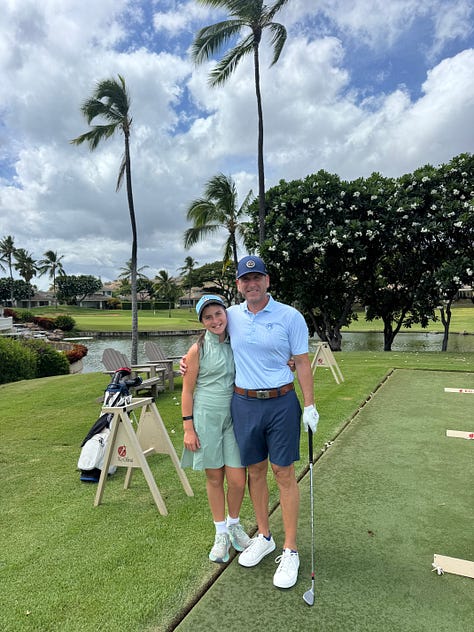I’ve been in Hawaii with my family since last Saturday. For years after I came home from prison, I didn’t travel unless it was related to a speaking event. Typically, I stayed home, worked, paid restitution, and told myself that anything close to rest or leisure had to wait. Even when I could afford it, I didn’t think I deserved it. Now I’m older. And I’m learning (slowly) that presence, forgiveness, and experiences matter more than punishment.

Two nights ago, Alyssa and I were attending a luau in Oahu when a man approached me quietly.
He said, “Hey man, I watch your videos. I just wanted to say congratulations.” (Alyssa thinks it’s super cool when someone stops me. It happens once or twice a month.) I thanked him. He told me he had first seen me in the Netflix movie Operation Varsity Blues.
I said, “You want to hear something funny?”
He said, “Yes.”
“When I found out Matthew Modine was cast in the movie as Rick Singer, I asked the producers if they’d send him a letter I wrote. He’s been one of my favorite actors since I saw Vision Quest as a teenager. They said yes. I never heard back, and that’s okay. Just knowing I got to be in something with him meant a lot to me.”
The guy smiled. “Man, Vision Quest, one of the best. I wrestled in high school.”
I said, “Same. I wasn’t a wrestler, but that movie stayed with me. Still does.”
Alyssa looked up. “What’s Vision Quest?”
I said, “Tonight, we’re watching it. No parasailing. No snorkeling. No banana boats. Just two hours, this movie, and me explaining why it’s so important to me.”
That night, while my wife and son went swimming, we watched it together. I’ve seen Vision Quest more times than I can count. But this time, sitting beside my daughter, I wasn’t just rewatching a movie. I was revisiting who I used to be and trying to show her why this movie from 1985, with a lot of bad reviews, is so meaningful to me.
The story follows Louden Swain, a high school wrestler who decides to drop two weight classes to face Brian Shute, the toughest guy in the state. No one tells him to do it. Everyone thinks he’s crazy. But he keeps going. He trains in silence. He runs until he passes out. He sweats through plastic suits. He stops talking to people who don’t get it. And more than anything, he stays disciplined and focused. He wakes early. He runs to school instead of hitching a ride. He turns down junk food, skips sugar, and sacrifices comfort. Even when his friends offer a ride on the back of a motorcycle, he says no because he knows he needs to run. That part always stuck with me.
I admired that discipline when I saw the movie in high school. And when I went to prison, I thought about it again. I tried to follow a structure in prison that would keep me focused: running long distances, avoiding sugary snacks in the chow hall and commissary (some dudes will buy six ice creams at 7 a.m. from the commissary and eat them all for breakfast), staying clear of distractions that could derail my progress. No alcohol, no distractions. Very, very little TV. No indulgence. I wanted to prove I could overcome this mess I created.
That prison term, in some ways, was my own vision quest, as corny and cliché as that might sound. It totally changed my life, in part because I needed to figure out whether I still had the ability to do hard things for no other reason than because I said I would. And when I didn’t do things I said I would, Michael held me accountable. A good mentor changes everything, but only if they are a truth-teller and authentic.
I’ve tried to carry that same Vision Quest mindset home, into a world full of temptations and shortcuts and excuses. I don’t always get it right. But I keep trying.
Do you remember what it felt like to be completely locked in, when you didn’t need praise, permission, or applause?
That was prison for me. That was baseball for me. And that’s what Louden was chasing: the desire to be locked in, the best he could be. And that’s what I want Alyssa to understand now: it’s a beautiful thing to pursue your goals even when people call you crazy.
There’s a moment where Louden says: “I just turned 18, I’m a wrestler, and I’ve got this idea in my head about becoming a man.”
I didn’t fully get that line in high school. I now know he’s not claiming to be a man; he’s pursuing it. That’s the difference between effort and ego. Between wanting to win and wanting to know what you’re made of.
There’s another line later when he’s doubting himself and says:
“It’s not that I’m afraid of Shute. I’m not afraid of Shute. I’m afraid of what’s happening to me. I’m changing, and I don’t know how.”
That quote is profound, because I know what it feels like to change faster than you can explain. Not yet having the words for what you’re becoming.
There’s a scene later in the movie that always stayed with me. Louden finds out that Elmo, the cook at the hotel where he works, is taking the night off to watch his match. Elmo barely makes any money. Louden doesn’t understand it.
He says, “Elmo, you’re taking a night off work, without pay, to watch me wrestle?”
Elmo doesn’t flinch.
He says, “Kid, I don’t know if you’re gonna win or lose. But I’ll be damned if I’m gonna miss this. You ever hear of Pele? You know who he is, right? Well, I was in the room once when Pele played. In the room. And I watched him, and I knew people would be talking about that night for fifty years. And I’ll be damned if I’m gonna miss this one.”
That scene says everything I try to say in these newsletters. Elmo wasn’t showing up for the win. He was showing up because he saw what Louden was doing, the decision to pursue something personal and painful with no guaranteed result. He recognized the rarity of someone who actually follows through. And that’s what I’ve tried to write about, week after week.
When we wrote The Underdog’s Edge, it wasn’t about winning. It was about the strength that comes from thinking differently, as an individual. When we wrote about The Stranger, it was about living authentically (consequences be damned). In Start With Why, I said most people never stick with the work because they never bother to define why they’re doing it. Louden didn’t have that problem. He knew exactly what he was after, even if he couldn’t explain it to anyone else.
This week, I kept thinking about another figure we’ve written about, John Galt. When Galt walked away from a world that didn’t understand him, he wasn’t disappearing on anyone else’s terms. Not explaining. Not justifying. Just choosing his work, his mind, and his values, and living them without apology. That’s what Louden was doing. And in a smaller way, that’s what each of us is doing when we stay the course through discomfort and isolation.
That’s what Elmo understood. And that’s what I hope Alyssa begins to grasp: you don’t need everyone to understand you. You just need one or two people who recognize that what you’re doing is rare and worth showing up for.
When the credits rolled, I looked over and asked her what she thought.
She said, “I liked it. I liked that he kept going. Even when people didn’t think he could. And I liked seeing Madonna sing!” That was enough.
It made me wonder: how many people reading this have quietly given up on something they still want, just because others didn’t understand it?
What would it look like if you showed up for yourself the way Elmo showed up for Louden?
If you’re building something people don’t understand, great. Just do as my friend Steve used to say after my release from prison: “Keep going.” If you’re putting in work and wondering if it will pay off, it does. And if you’re still defining what that project is, or how to communicate it to others, join us in our next webinar or reply here.
We won’t tell you what your Vision Quest should be. But we’ll ask the right questions to help you see it more clearly.
That’s a wrap. We are an hour away from landing at LAX on Saturday, July 26th. Sending this newsletter to my friend, marketing expert, and partner, Tyler, who will share it with our community.
Thanks for reading!!
JP



